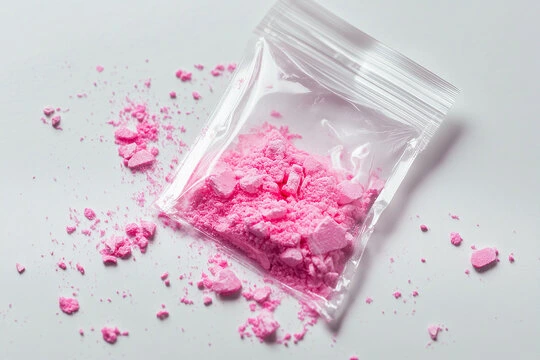Understanding the Dangers of Tusi Drug
Pink cocaine, also known as Tusi, has recently gained attention as a dangerous and illicit drug circulating in social scenes. While the name implies a relation to cocaine, pink cocaine is a dissociative, synthetic substance with far more risks. DetoxLA offers a safe path to recovery for those struggling with addiction, including the dangers posed by new, unpredictable drugs like pink cocaine.
What Is Pink Cocaine?
Pink cocaine, or Tusi, is a party drug that has nothing to do with traditional cocaine. Its name comes from its pink, powder-like appearance, but the actual ingredients can vary. Often, it’s a mixture of synthetic drugs like ketamine and MDMA, and its effects can be highly unpredictable. This dissociative drug is dangerous due to its unknown potency and mixture of chemicals, making it difficult to understand how it will affect users.
Pink Cocaine Meaning and Origins
The meaning behind pink cocaine, or Tusi, lies in its colorful appearance and its rise in popularity at social gatherings, especially in Latin America. While it mimics the effects of MDMA, its dissociative properties can result in dangerous side effects. The drug has rapidly made its way into the nightlife scene but remains highly unregulated, increasing its risks.
Can Cocaine Be Pink?
Many wonder, “Can cocaine be pink?” The answer is no—pink cocaine is not derived from actual cocaine. While its name suggests a relationship with the stimulant, Tusi is composed of synthetic chemicals, leading to dissociative effects rather than the euphoric high often associated with cocaine.
What Is the Tusi Drug?
Tusi is the street name for pink cocaine and is typically used in party environments for its hallucinogenic and stimulating effects. However, unlike traditional stimulants, Tusi is a dissociative drug that can cause dangerous side effects such as memory loss, hallucinations, and extreme mood swings. Due to the varying makeup of the drug, users are often unaware of the true dangers they face when ingesting it.
The Risks of Using Pink Cocaine
One of the most significant risks associated with Tusi is its unpredictable composition. Users cannot be sure of what they’re taking, which leads to a higher risk of overdose or severe health complications. The dissociative nature of the drug can cause users to lose touch with reality, leading to risky behavior or accidents. Furthermore, long-term use can lead to severe mental health issues and addiction.
Seeking Help for Pink Cocaine Addiction
DetoxLA offers a comprehensive approach to treating addiction to synthetic drugs like Tusi or pink cocaine. Our medically supervised detox and rehab programs provide the support needed to safely withdraw from these substances, followed by tailored treatment plans for long-term recovery.
Pink Cocaine Tusi and the Connection to Dissociatives
Unlike cocaine, Tusi acts more like a dissociative drug, meaning it alters perception and can cause feelings of detachment from reality. This effect is more commonly seen in drugs like ketamine, which is often found in pink cocaine. The combination of dissociative effects and hallucinogenic properties makes pink cocaine highly dangerous, particularly for users unfamiliar with its risks.
Contact DetoxLA Today!
While the colorful appearance of pink cocaine may seem harmless, the truth is far more sinister. This dissociative drug carries serious risks that can lead to addiction and long-term health issues. DetoxLA provides a safe and supportive environment for those seeking recovery from dangerous substances like pink cocaine, with a team of professionals ready to guide individuals through detox and into sustainable sobriety.
FAQs
What is pink cocaine?
Pink cocaine, also known as Tusi, is a synthetic party drug with dissociative effects, often made from a mix of substances like ketamine and MDMA.
Is pink cocaine the same as regular cocaine?
No, pink cocaine is not related to regular cocaine. It contains synthetic drugs and acts more like a hallucinogen or dissociative.
Can cocaine be pink?
No, cocaine cannot naturally be pink. The drug referred to as pink cocaine, or Tusi, is made from other substances that give it its pink appearance.
What are the effects of pink cocaine?
Pink cocaine can cause dissociation, hallucinations, and extreme mood changes. Its unpredictable ingredients make it highly dangerous.
Is pink cocaine addictive?
Yes, pink cocaine can be addictive due to the synthetic substances it contains, leading to dependence and harmful long-term effects.
How dangerous is pink cocaine?
Pink cocaine is highly dangerous due to its unknown composition, which increases the risk of overdose, severe health complications, and long-term mental health issues.
What is the tusi drug?
Tusi is a slang term for pink cocaine, a synthetic party drug often containing ketamine, which causes dissociative and hallucinogenic effects.

